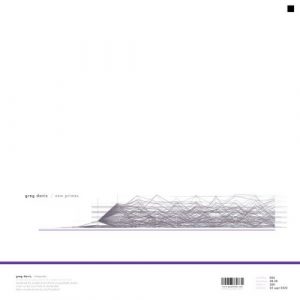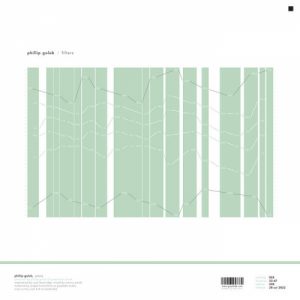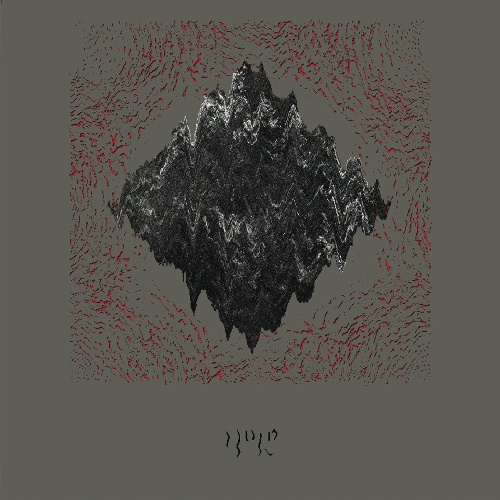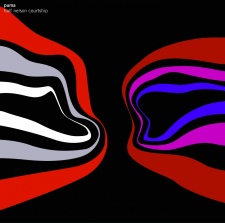 Few labels have such a defined remit as Greyfade, who for the last few years have released a steady stream of thoughtful academic works concerned with precision, process and sonic nuance.
Few labels have such a defined remit as Greyfade, who for the last few years have released a steady stream of thoughtful academic works concerned with precision, process and sonic nuance.
Following the heady splendour of last year’s Rag’sma by Christopher Otto and JACK Quartet, as well as label-boss Joseph Branciforte and Kenneth Kirschner’s From The Machine, 2022 sees the release of two new works of minimal, pensive composition.
Greg Davis’s New Primes* is an undeniably sterile piece, a procedural composition that “uses prime numbers sets to explore an integrated harmonic, rhythmic, and formal space in just intonation”. If that’s the sort of thing that gets you hot under the collar, you’re in for a treat — Davis paints with a wonderfully purist mentality, drawing interest from the building blocks of the sonic process itself.Here, timbre and rhythm are shown to be the subsets of harmony and frequency they truly are, with the relationships the composer prioritises (or perhaps, more accurately, those prioritised by his numeric process) conjuring a wealth of hypnotic overtones and gentle rhythms. Whilst the result is a sound world that might broadly be considered part of the wider drone oeuvre, New Primes has far more in common with the work of early additive composers like Barry Truax than it does with the raging guitar drones that have come to typify much of the modern take on the genre.
And yet, this is not simply some throwback to the heyday of chin-stroking electronic composition. Davis may channel a fearsome deliberation and an often staggering sense of restraint, but the six pieces here are nonetheless rich in colour and in purpose. Whilst it may be obvious to point out that the overlaying of harmonically related drones will result in pleasing beating patterns and emergent timbral complexity, New Primes seems to treat such phenomena with a deft hand, a vibrant, minimal tapestry of overlapping shapes and textures. Brevity, too, plays its part — Davis has an unusual habit of pulling away from such qualities with relative speed — rather than highlighting an emergent rhythm with an analogical luminous felt-tip, the composer instead sits with any given conflux — a beating thrum, or a growling overtone — only long enough for it to speak with clarity, before falling back into some other related, but distinct manifestation. As such, it is an album rife with motion, a work that carries its listener across an ocean of inter-related sound, a placid and mesmerising ebb and flow.Somewhat by its nature, working so intimately with overtones often risks a work disintegrating into the harsh and the unpleasant, yet Davis demonstrates an almost superhuman ability to keep such things in check. From a production standpoint alone, New Primes is impressive for always sounding so refined, with even its most resonant edges presented with definite softness, a pleasing calmness that pervades throughout the entire album, placating and reframing the complexity within.
 Loitering at the other end of the sonic spectrum, Phillip Golub’s Filters is a meditative piano work that explores the affordances of performative repetition. Comprised of four pieces clocking in at around eight minutes each — though each culled from longer 45-minute performances — the work questions the nature of organic repetition, the devolution of a small fragment of composition over time.
Loitering at the other end of the sonic spectrum, Phillip Golub’s Filters is a meditative piano work that explores the affordances of performative repetition. Comprised of four pieces clocking in at around eight minutes each — though each culled from longer 45-minute performances — the work questions the nature of organic repetition, the devolution of a small fragment of composition over time.
The interplay of major and minor triads against a backdrop of higher and lower pitches allows for a constant harmonic reframing, with the simplicity of the core content producing a tempered tranquillity seemingly built for getting ‘lost’ in. Though notionally a loop, each piece nonetheless harbours some degree of structure, different variations upon the given harmonic theme.
Interestingly, the perception of repetition is compromised by the freedom by which Golub approaches his performance. Each loop is conducted with a sombre lilt, a sense of rubato such that the repeating patterns are dislocated from any more mechanical sense of meter, each phrase run through with the all too human qualities of its performer. It is here, in the balance between repetition and freedom, that Filters comes to life — an organic, electrifying lethargy underpins an otherwise academic harmonic study, drawing from the simplicity of its chords an almost trance-like ether that could feasibly go on forever. And if it at times the whole thing risks coming across as a little too cuddly at its edges, a little too pleasant, the whole thing is rendered with a surprisingly heavy hand, its convivial character offset by a faintly stroppy piano that lingers ever on the border of a near-imperceivable tension. Golub succeeds with a procedural study that could so easily have been less than the sum of its parts, and yet manages to elevate itself beyond the trappings of ‘nice’ chords and harmonic dexterity.Rather than sating its listener with easy pleasantries, Filters seeks to enliven its raw materials by relocating them within the physical realm, the ritual of performance, its subject not so much repetition as the articulation of difference.
-Daniel Alexander Hignell-
- See here for an alternate review.



